Brexit's Impact on UK Construction
VerifiedAdded on 2020/01/28
|10
|2576
|37
Report
AI Summary
This assignment analyzes the significant impact of Brexit on the UK construction industry. It highlights the negative effects on operations, growth, and development due to factors like reduced EU funding, skill shortages, and project delays/cancellations. The report underscores the challenges faced by housebuilders and the potential for a severe economic downturn.
Contribute Materials
Your contribution can guide someone’s learning journey. Share your
documents today.

Business Communication
Secure Best Marks with AI Grader
Need help grading? Try our AI Grader for instant feedback on your assignments.
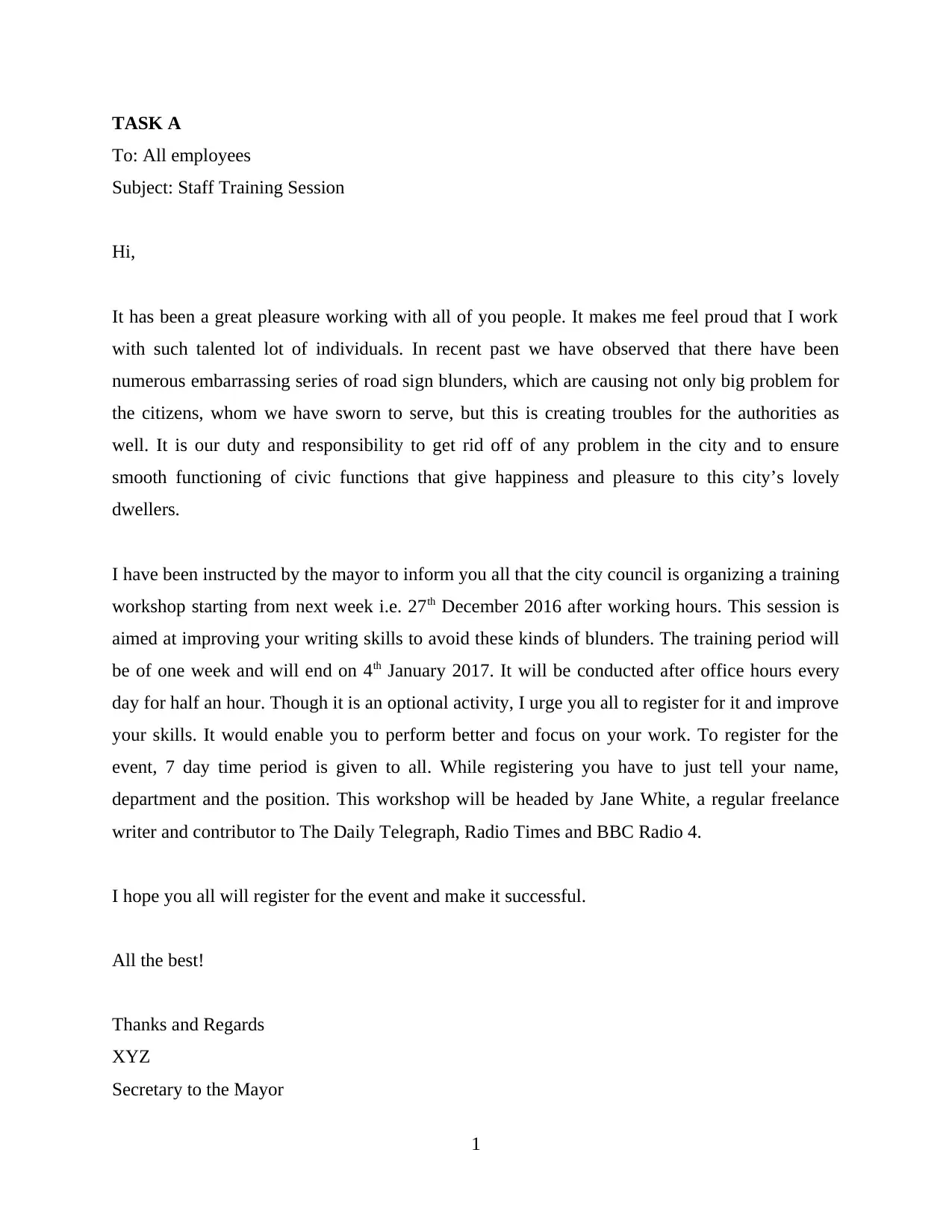
TASK A
To: All employees
Subject: Staff Training Session
Hi,
It has been a great pleasure working with all of you people. It makes me feel proud that I work
with such talented lot of individuals. In recent past we have observed that there have been
numerous embarrassing series of road sign blunders, which are causing not only big problem for
the citizens, whom we have sworn to serve, but this is creating troubles for the authorities as
well. It is our duty and responsibility to get rid off of any problem in the city and to ensure
smooth functioning of civic functions that give happiness and pleasure to this city’s lovely
dwellers.
I have been instructed by the mayor to inform you all that the city council is organizing a training
workshop starting from next week i.e. 27th December 2016 after working hours. This session is
aimed at improving your writing skills to avoid these kinds of blunders. The training period will
be of one week and will end on 4th January 2017. It will be conducted after office hours every
day for half an hour. Though it is an optional activity, I urge you all to register for it and improve
your skills. It would enable you to perform better and focus on your work. To register for the
event, 7 day time period is given to all. While registering you have to just tell your name,
department and the position. This workshop will be headed by Jane White, a regular freelance
writer and contributor to The Daily Telegraph, Radio Times and BBC Radio 4.
I hope you all will register for the event and make it successful.
All the best!
Thanks and Regards
XYZ
Secretary to the Mayor
1
To: All employees
Subject: Staff Training Session
Hi,
It has been a great pleasure working with all of you people. It makes me feel proud that I work
with such talented lot of individuals. In recent past we have observed that there have been
numerous embarrassing series of road sign blunders, which are causing not only big problem for
the citizens, whom we have sworn to serve, but this is creating troubles for the authorities as
well. It is our duty and responsibility to get rid off of any problem in the city and to ensure
smooth functioning of civic functions that give happiness and pleasure to this city’s lovely
dwellers.
I have been instructed by the mayor to inform you all that the city council is organizing a training
workshop starting from next week i.e. 27th December 2016 after working hours. This session is
aimed at improving your writing skills to avoid these kinds of blunders. The training period will
be of one week and will end on 4th January 2017. It will be conducted after office hours every
day for half an hour. Though it is an optional activity, I urge you all to register for it and improve
your skills. It would enable you to perform better and focus on your work. To register for the
event, 7 day time period is given to all. While registering you have to just tell your name,
department and the position. This workshop will be headed by Jane White, a regular freelance
writer and contributor to The Daily Telegraph, Radio Times and BBC Radio 4.
I hope you all will register for the event and make it successful.
All the best!
Thanks and Regards
XYZ
Secretary to the Mayor
1
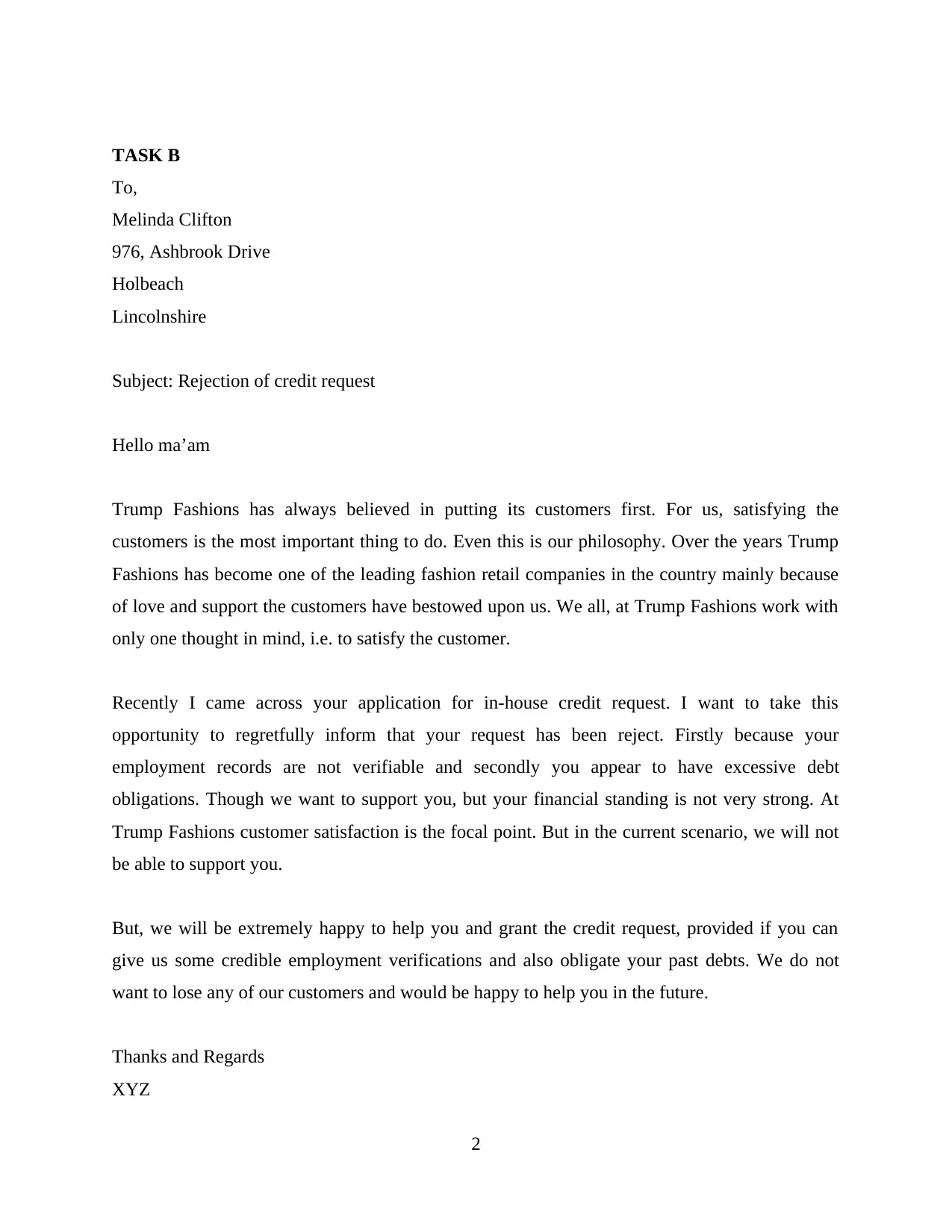
TASK B
To,
Melinda Clifton
976, Ashbrook Drive
Holbeach
Lincolnshire
Subject: Rejection of credit request
Hello ma’am
Trump Fashions has always believed in putting its customers first. For us, satisfying the
customers is the most important thing to do. Even this is our philosophy. Over the years Trump
Fashions has become one of the leading fashion retail companies in the country mainly because
of love and support the customers have bestowed upon us. We all, at Trump Fashions work with
only one thought in mind, i.e. to satisfy the customer.
Recently I came across your application for in-house credit request. I want to take this
opportunity to regretfully inform that your request has been reject. Firstly because your
employment records are not verifiable and secondly you appear to have excessive debt
obligations. Though we want to support you, but your financial standing is not very strong. At
Trump Fashions customer satisfaction is the focal point. But in the current scenario, we will not
be able to support you.
But, we will be extremely happy to help you and grant the credit request, provided if you can
give us some credible employment verifications and also obligate your past debts. We do not
want to lose any of our customers and would be happy to help you in the future.
Thanks and Regards
XYZ
2
To,
Melinda Clifton
976, Ashbrook Drive
Holbeach
Lincolnshire
Subject: Rejection of credit request
Hello ma’am
Trump Fashions has always believed in putting its customers first. For us, satisfying the
customers is the most important thing to do. Even this is our philosophy. Over the years Trump
Fashions has become one of the leading fashion retail companies in the country mainly because
of love and support the customers have bestowed upon us. We all, at Trump Fashions work with
only one thought in mind, i.e. to satisfy the customer.
Recently I came across your application for in-house credit request. I want to take this
opportunity to regretfully inform that your request has been reject. Firstly because your
employment records are not verifiable and secondly you appear to have excessive debt
obligations. Though we want to support you, but your financial standing is not very strong. At
Trump Fashions customer satisfaction is the focal point. But in the current scenario, we will not
be able to support you.
But, we will be extremely happy to help you and grant the credit request, provided if you can
give us some credible employment verifications and also obligate your past debts. We do not
want to lose any of our customers and would be happy to help you in the future.
Thanks and Regards
XYZ
2
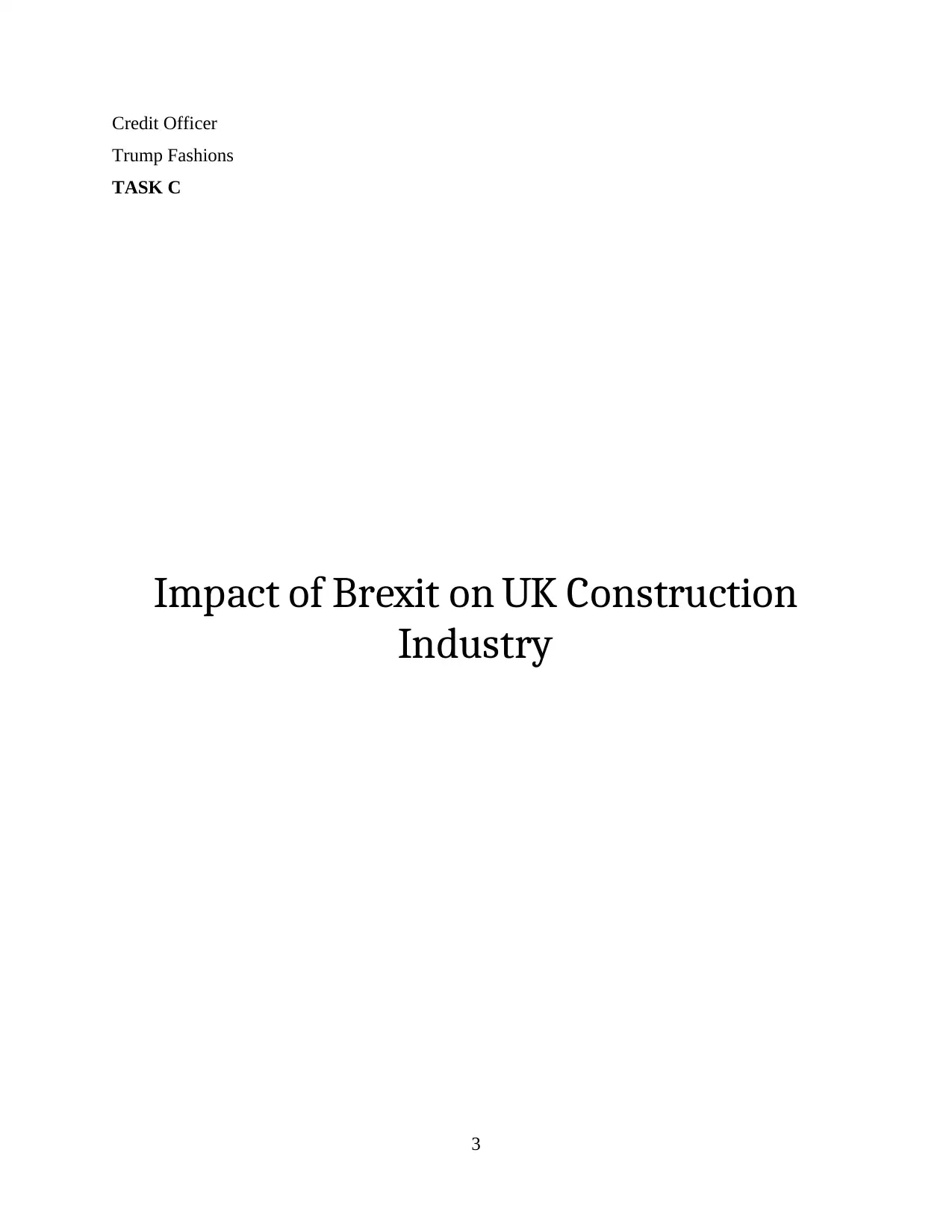
Credit Officer
Trump Fashions
TASK C
Impact of Brexit on UK Construction
Industry
3
Trump Fashions
TASK C
Impact of Brexit on UK Construction
Industry
3
Secure Best Marks with AI Grader
Need help grading? Try our AI Grader for instant feedback on your assignments.
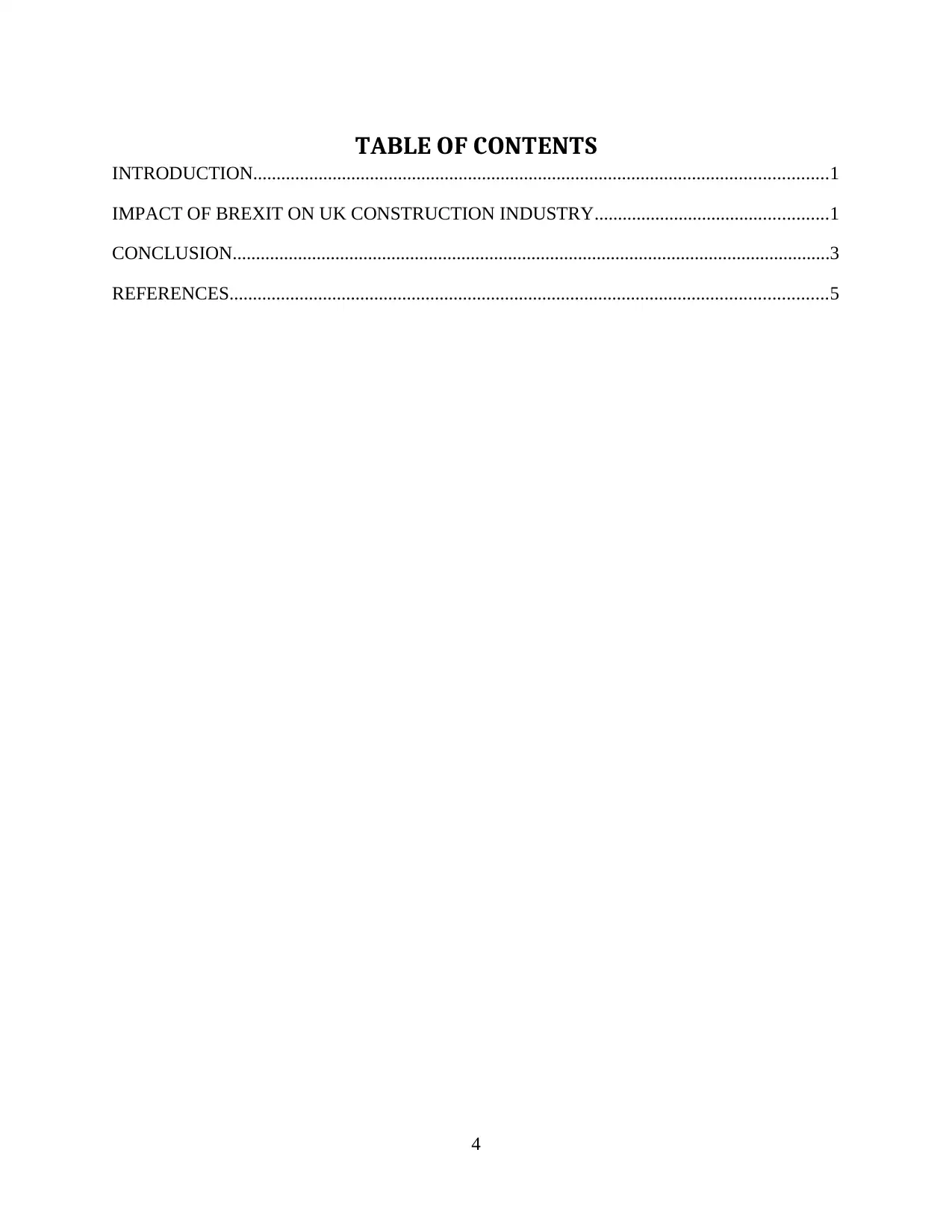
TABLE OF CONTENTS
INTRODUCTION...........................................................................................................................1
IMPACT OF BREXIT ON UK CONSTRUCTION INDUSTRY..................................................1
CONCLUSION................................................................................................................................3
REFERENCES................................................................................................................................5
4
INTRODUCTION...........................................................................................................................1
IMPACT OF BREXIT ON UK CONSTRUCTION INDUSTRY..................................................1
CONCLUSION................................................................................................................................3
REFERENCES................................................................................................................................5
4
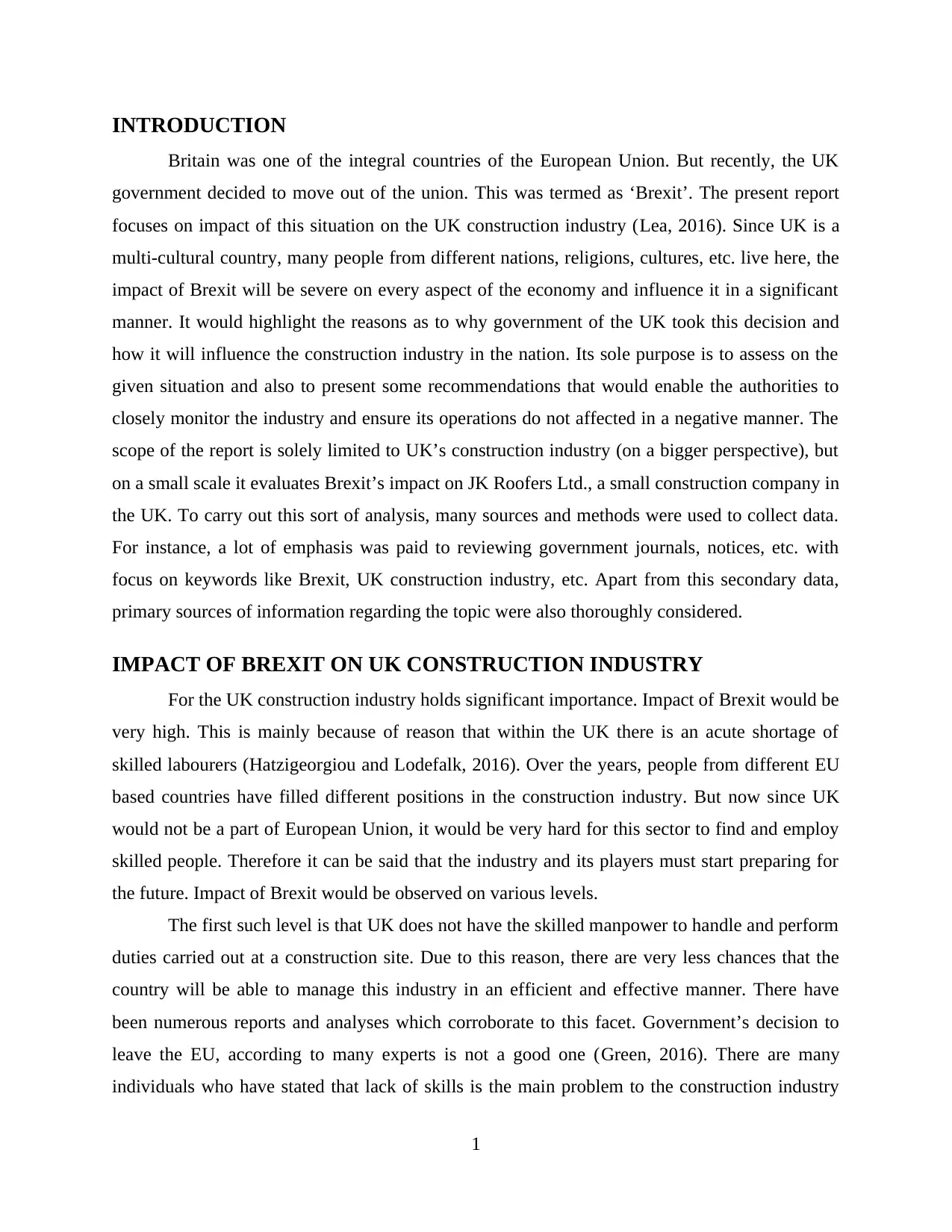
INTRODUCTION
Britain was one of the integral countries of the European Union. But recently, the UK
government decided to move out of the union. This was termed as ‘Brexit’. The present report
focuses on impact of this situation on the UK construction industry (Lea, 2016). Since UK is a
multi-cultural country, many people from different nations, religions, cultures, etc. live here, the
impact of Brexit will be severe on every aspect of the economy and influence it in a significant
manner. It would highlight the reasons as to why government of the UK took this decision and
how it will influence the construction industry in the nation. Its sole purpose is to assess on the
given situation and also to present some recommendations that would enable the authorities to
closely monitor the industry and ensure its operations do not affected in a negative manner. The
scope of the report is solely limited to UK’s construction industry (on a bigger perspective), but
on a small scale it evaluates Brexit’s impact on JK Roofers Ltd., a small construction company in
the UK. To carry out this sort of analysis, many sources and methods were used to collect data.
For instance, a lot of emphasis was paid to reviewing government journals, notices, etc. with
focus on keywords like Brexit, UK construction industry, etc. Apart from this secondary data,
primary sources of information regarding the topic were also thoroughly considered.
IMPACT OF BREXIT ON UK CONSTRUCTION INDUSTRY
For the UK construction industry holds significant importance. Impact of Brexit would be
very high. This is mainly because of reason that within the UK there is an acute shortage of
skilled labourers (Hatzigeorgiou and Lodefalk, 2016). Over the years, people from different EU
based countries have filled different positions in the construction industry. But now since UK
would not be a part of European Union, it would be very hard for this sector to find and employ
skilled people. Therefore it can be said that the industry and its players must start preparing for
the future. Impact of Brexit would be observed on various levels.
The first such level is that UK does not have the skilled manpower to handle and perform
duties carried out at a construction site. Due to this reason, there are very less chances that the
country will be able to manage this industry in an efficient and effective manner. There have
been numerous reports and analyses which corroborate to this facet. Government’s decision to
leave the EU, according to many experts is not a good one (Green, 2016). There are many
individuals who have stated that lack of skills is the main problem to the construction industry
1
Britain was one of the integral countries of the European Union. But recently, the UK
government decided to move out of the union. This was termed as ‘Brexit’. The present report
focuses on impact of this situation on the UK construction industry (Lea, 2016). Since UK is a
multi-cultural country, many people from different nations, religions, cultures, etc. live here, the
impact of Brexit will be severe on every aspect of the economy and influence it in a significant
manner. It would highlight the reasons as to why government of the UK took this decision and
how it will influence the construction industry in the nation. Its sole purpose is to assess on the
given situation and also to present some recommendations that would enable the authorities to
closely monitor the industry and ensure its operations do not affected in a negative manner. The
scope of the report is solely limited to UK’s construction industry (on a bigger perspective), but
on a small scale it evaluates Brexit’s impact on JK Roofers Ltd., a small construction company in
the UK. To carry out this sort of analysis, many sources and methods were used to collect data.
For instance, a lot of emphasis was paid to reviewing government journals, notices, etc. with
focus on keywords like Brexit, UK construction industry, etc. Apart from this secondary data,
primary sources of information regarding the topic were also thoroughly considered.
IMPACT OF BREXIT ON UK CONSTRUCTION INDUSTRY
For the UK construction industry holds significant importance. Impact of Brexit would be
very high. This is mainly because of reason that within the UK there is an acute shortage of
skilled labourers (Hatzigeorgiou and Lodefalk, 2016). Over the years, people from different EU
based countries have filled different positions in the construction industry. But now since UK
would not be a part of European Union, it would be very hard for this sector to find and employ
skilled people. Therefore it can be said that the industry and its players must start preparing for
the future. Impact of Brexit would be observed on various levels.
The first such level is that UK does not have the skilled manpower to handle and perform
duties carried out at a construction site. Due to this reason, there are very less chances that the
country will be able to manage this industry in an efficient and effective manner. There have
been numerous reports and analyses which corroborate to this facet. Government’s decision to
leave the EU, according to many experts is not a good one (Green, 2016). There are many
individuals who have stated that lack of skills is the main problem to the construction industry
1
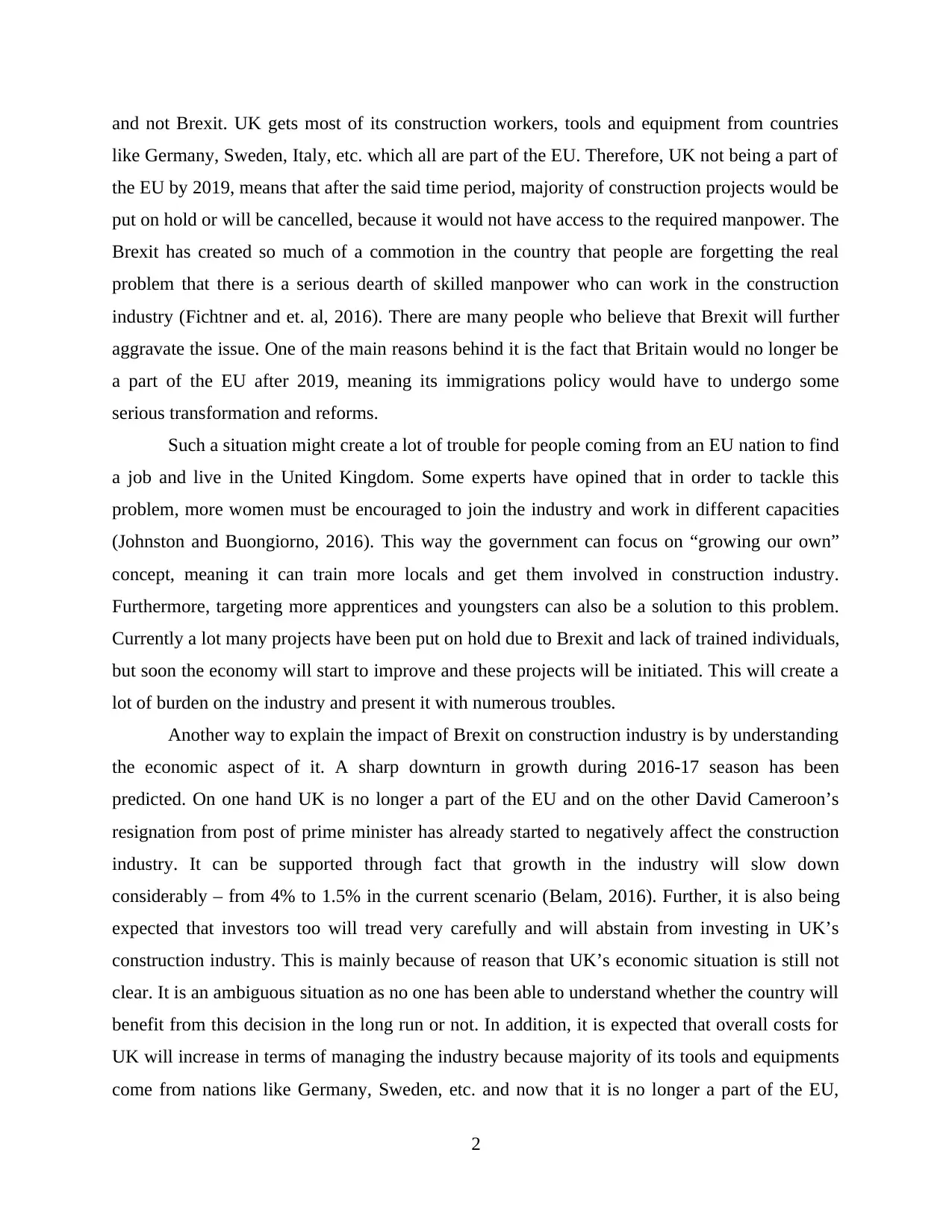
and not Brexit. UK gets most of its construction workers, tools and equipment from countries
like Germany, Sweden, Italy, etc. which all are part of the EU. Therefore, UK not being a part of
the EU by 2019, means that after the said time period, majority of construction projects would be
put on hold or will be cancelled, because it would not have access to the required manpower. The
Brexit has created so much of a commotion in the country that people are forgetting the real
problem that there is a serious dearth of skilled manpower who can work in the construction
industry (Fichtner and et. al, 2016). There are many people who believe that Brexit will further
aggravate the issue. One of the main reasons behind it is the fact that Britain would no longer be
a part of the EU after 2019, meaning its immigrations policy would have to undergo some
serious transformation and reforms.
Such a situation might create a lot of trouble for people coming from an EU nation to find
a job and live in the United Kingdom. Some experts have opined that in order to tackle this
problem, more women must be encouraged to join the industry and work in different capacities
(Johnston and Buongiorno, 2016). This way the government can focus on “growing our own”
concept, meaning it can train more locals and get them involved in construction industry.
Furthermore, targeting more apprentices and youngsters can also be a solution to this problem.
Currently a lot many projects have been put on hold due to Brexit and lack of trained individuals,
but soon the economy will start to improve and these projects will be initiated. This will create a
lot of burden on the industry and present it with numerous troubles.
Another way to explain the impact of Brexit on construction industry is by understanding
the economic aspect of it. A sharp downturn in growth during 2016-17 season has been
predicted. On one hand UK is no longer a part of the EU and on the other David Cameroon’s
resignation from post of prime minister has already started to negatively affect the construction
industry. It can be supported through fact that growth in the industry will slow down
considerably – from 4% to 1.5% in the current scenario (Belam, 2016). Further, it is also being
expected that investors too will tread very carefully and will abstain from investing in UK’s
construction industry. This is mainly because of reason that UK’s economic situation is still not
clear. It is an ambiguous situation as no one has been able to understand whether the country will
benefit from this decision in the long run or not. In addition, it is expected that overall costs for
UK will increase in terms of managing the industry because majority of its tools and equipments
come from nations like Germany, Sweden, etc. and now that it is no longer a part of the EU,
2
like Germany, Sweden, Italy, etc. which all are part of the EU. Therefore, UK not being a part of
the EU by 2019, means that after the said time period, majority of construction projects would be
put on hold or will be cancelled, because it would not have access to the required manpower. The
Brexit has created so much of a commotion in the country that people are forgetting the real
problem that there is a serious dearth of skilled manpower who can work in the construction
industry (Fichtner and et. al, 2016). There are many people who believe that Brexit will further
aggravate the issue. One of the main reasons behind it is the fact that Britain would no longer be
a part of the EU after 2019, meaning its immigrations policy would have to undergo some
serious transformation and reforms.
Such a situation might create a lot of trouble for people coming from an EU nation to find
a job and live in the United Kingdom. Some experts have opined that in order to tackle this
problem, more women must be encouraged to join the industry and work in different capacities
(Johnston and Buongiorno, 2016). This way the government can focus on “growing our own”
concept, meaning it can train more locals and get them involved in construction industry.
Furthermore, targeting more apprentices and youngsters can also be a solution to this problem.
Currently a lot many projects have been put on hold due to Brexit and lack of trained individuals,
but soon the economy will start to improve and these projects will be initiated. This will create a
lot of burden on the industry and present it with numerous troubles.
Another way to explain the impact of Brexit on construction industry is by understanding
the economic aspect of it. A sharp downturn in growth during 2016-17 season has been
predicted. On one hand UK is no longer a part of the EU and on the other David Cameroon’s
resignation from post of prime minister has already started to negatively affect the construction
industry. It can be supported through fact that growth in the industry will slow down
considerably – from 4% to 1.5% in the current scenario (Belam, 2016). Further, it is also being
expected that investors too will tread very carefully and will abstain from investing in UK’s
construction industry. This is mainly because of reason that UK’s economic situation is still not
clear. It is an ambiguous situation as no one has been able to understand whether the country will
benefit from this decision in the long run or not. In addition, it is expected that overall costs for
UK will increase in terms of managing the industry because majority of its tools and equipments
come from nations like Germany, Sweden, etc. and now that it is no longer a part of the EU,
2
Paraphrase This Document
Need a fresh take? Get an instant paraphrase of this document with our AI Paraphraser
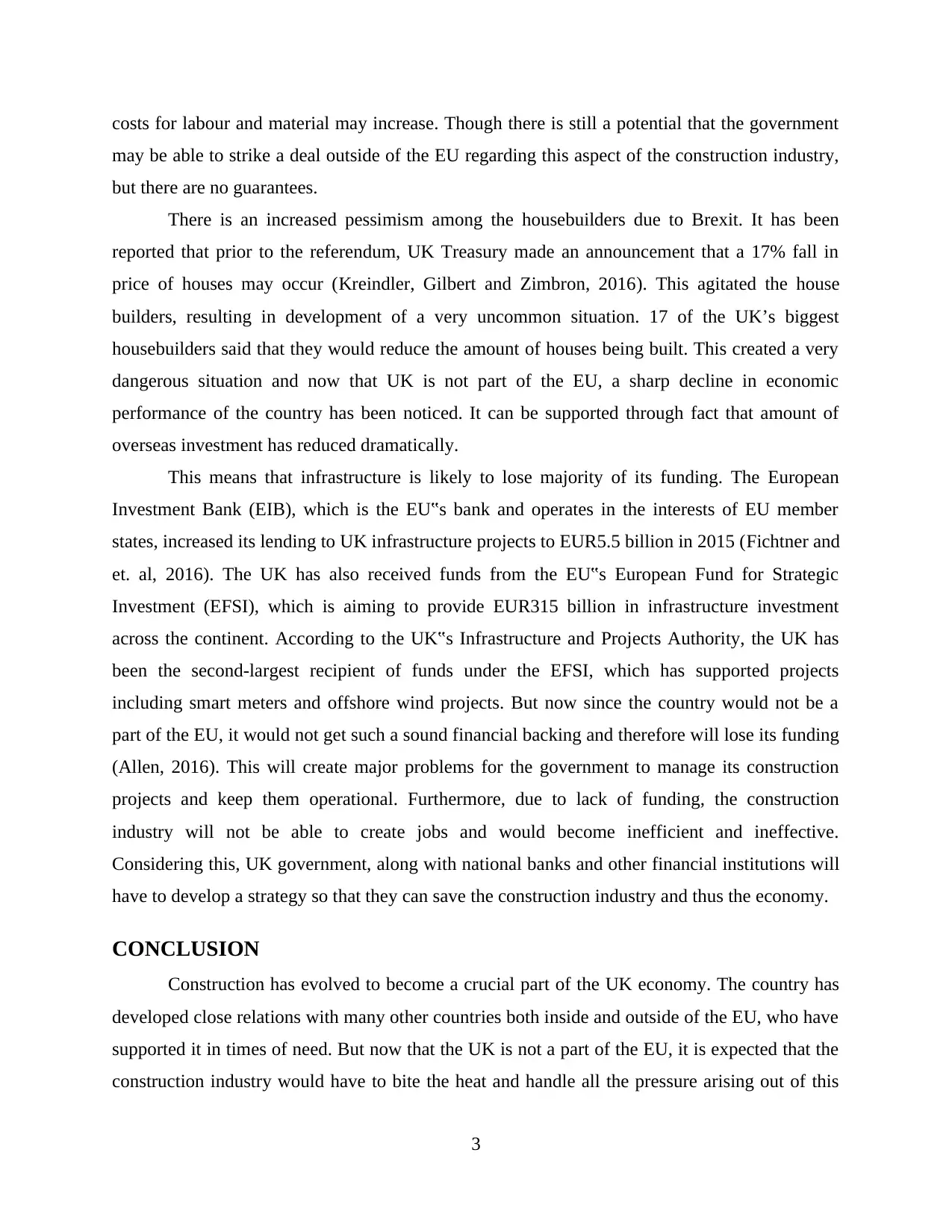
costs for labour and material may increase. Though there is still a potential that the government
may be able to strike a deal outside of the EU regarding this aspect of the construction industry,
but there are no guarantees.
There is an increased pessimism among the housebuilders due to Brexit. It has been
reported that prior to the referendum, UK Treasury made an announcement that a 17% fall in
price of houses may occur (Kreindler, Gilbert and Zimbron, 2016). This agitated the house
builders, resulting in development of a very uncommon situation. 17 of the UK’s biggest
housebuilders said that they would reduce the amount of houses being built. This created a very
dangerous situation and now that UK is not part of the EU, a sharp decline in economic
performance of the country has been noticed. It can be supported through fact that amount of
overseas investment has reduced dramatically.
This means that infrastructure is likely to lose majority of its funding. The European
Investment Bank (EIB), which is the EU‟s bank and operates in the interests of EU member
states, increased its lending to UK infrastructure projects to EUR5.5 billion in 2015 (Fichtner and
et. al, 2016). The UK has also received funds from the EU‟s European Fund for Strategic
Investment (EFSI), which is aiming to provide EUR315 billion in infrastructure investment
across the continent. According to the UK‟s Infrastructure and Projects Authority, the UK has
been the second-largest recipient of funds under the EFSI, which has supported projects
including smart meters and offshore wind projects. But now since the country would not be a
part of the EU, it would not get such a sound financial backing and therefore will lose its funding
(Allen, 2016). This will create major problems for the government to manage its construction
projects and keep them operational. Furthermore, due to lack of funding, the construction
industry will not be able to create jobs and would become inefficient and ineffective.
Considering this, UK government, along with national banks and other financial institutions will
have to develop a strategy so that they can save the construction industry and thus the economy.
CONCLUSION
Construction has evolved to become a crucial part of the UK economy. The country has
developed close relations with many other countries both inside and outside of the EU, who have
supported it in times of need. But now that the UK is not a part of the EU, it is expected that the
construction industry would have to bite the heat and handle all the pressure arising out of this
3
may be able to strike a deal outside of the EU regarding this aspect of the construction industry,
but there are no guarantees.
There is an increased pessimism among the housebuilders due to Brexit. It has been
reported that prior to the referendum, UK Treasury made an announcement that a 17% fall in
price of houses may occur (Kreindler, Gilbert and Zimbron, 2016). This agitated the house
builders, resulting in development of a very uncommon situation. 17 of the UK’s biggest
housebuilders said that they would reduce the amount of houses being built. This created a very
dangerous situation and now that UK is not part of the EU, a sharp decline in economic
performance of the country has been noticed. It can be supported through fact that amount of
overseas investment has reduced dramatically.
This means that infrastructure is likely to lose majority of its funding. The European
Investment Bank (EIB), which is the EU‟s bank and operates in the interests of EU member
states, increased its lending to UK infrastructure projects to EUR5.5 billion in 2015 (Fichtner and
et. al, 2016). The UK has also received funds from the EU‟s European Fund for Strategic
Investment (EFSI), which is aiming to provide EUR315 billion in infrastructure investment
across the continent. According to the UK‟s Infrastructure and Projects Authority, the UK has
been the second-largest recipient of funds under the EFSI, which has supported projects
including smart meters and offshore wind projects. But now since the country would not be a
part of the EU, it would not get such a sound financial backing and therefore will lose its funding
(Allen, 2016). This will create major problems for the government to manage its construction
projects and keep them operational. Furthermore, due to lack of funding, the construction
industry will not be able to create jobs and would become inefficient and ineffective.
Considering this, UK government, along with national banks and other financial institutions will
have to develop a strategy so that they can save the construction industry and thus the economy.
CONCLUSION
Construction has evolved to become a crucial part of the UK economy. The country has
developed close relations with many other countries both inside and outside of the EU, who have
supported it in times of need. But now that the UK is not a part of the EU, it is expected that the
construction industry would have to bite the heat and handle all the pressure arising out of this
3
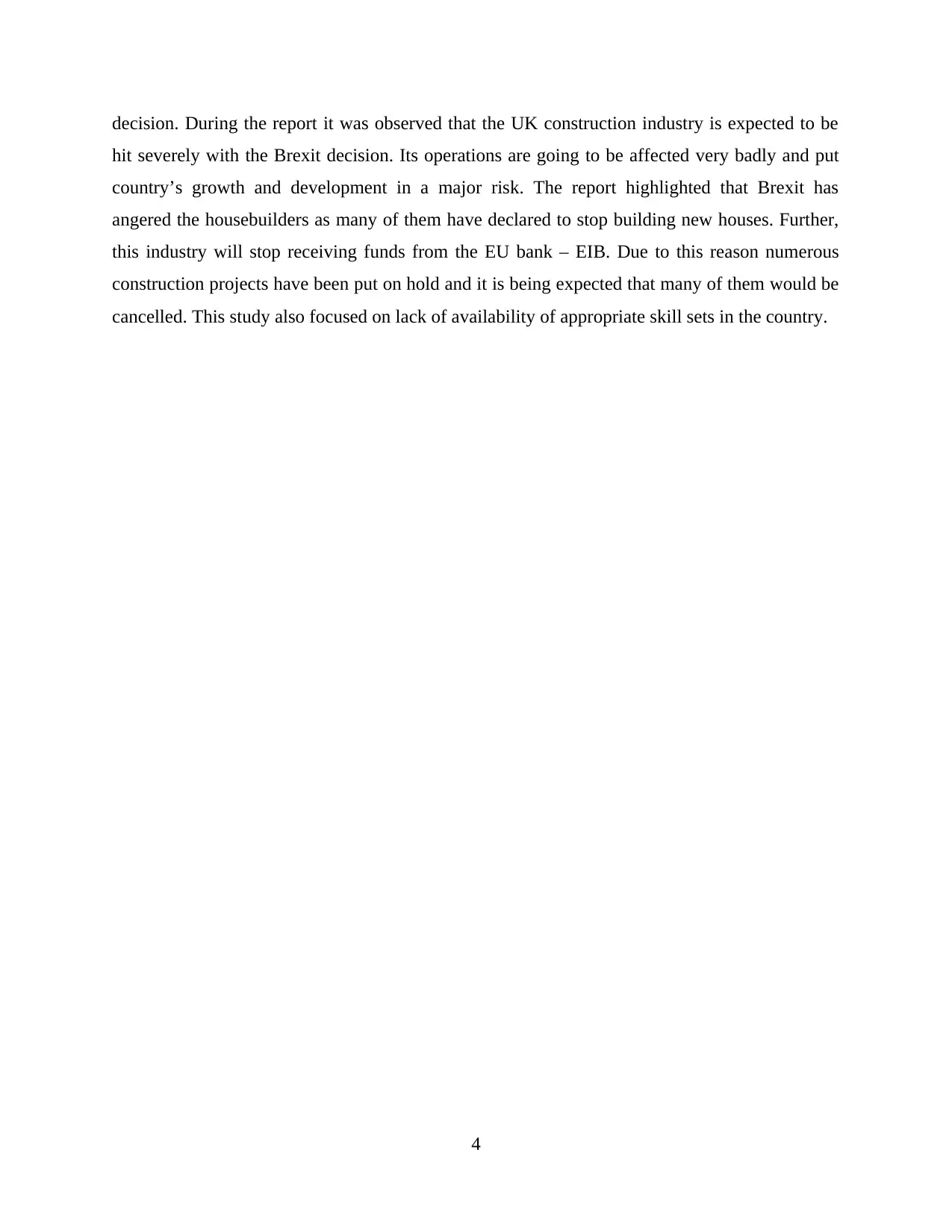
decision. During the report it was observed that the UK construction industry is expected to be
hit severely with the Brexit decision. Its operations are going to be affected very badly and put
country’s growth and development in a major risk. The report highlighted that Brexit has
angered the housebuilders as many of them have declared to stop building new houses. Further,
this industry will stop receiving funds from the EU bank – EIB. Due to this reason numerous
construction projects have been put on hold and it is being expected that many of them would be
cancelled. This study also focused on lack of availability of appropriate skill sets in the country.
4
hit severely with the Brexit decision. Its operations are going to be affected very badly and put
country’s growth and development in a major risk. The report highlighted that Brexit has
angered the housebuilders as many of them have declared to stop building new houses. Further,
this industry will stop receiving funds from the EU bank – EIB. Due to this reason numerous
construction projects have been put on hold and it is being expected that many of them would be
cancelled. This study also focused on lack of availability of appropriate skill sets in the country.
4
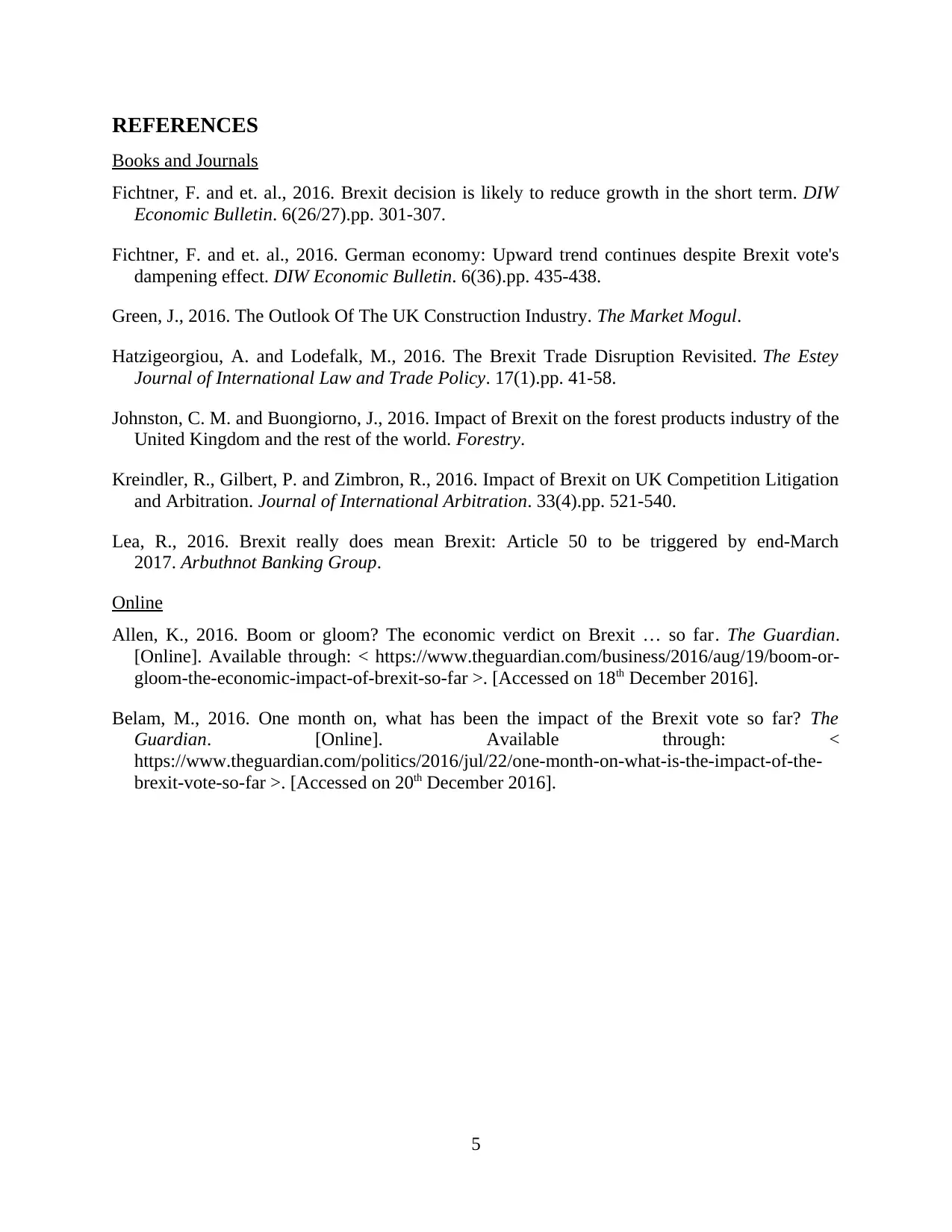
REFERENCES
Books and Journals
Fichtner, F. and et. al., 2016. Brexit decision is likely to reduce growth in the short term. DIW
Economic Bulletin. 6(26/27).pp. 301-307.
Fichtner, F. and et. al., 2016. German economy: Upward trend continues despite Brexit vote's
dampening effect. DIW Economic Bulletin. 6(36).pp. 435-438.
Green, J., 2016. The Outlook Of The UK Construction Industry. The Market Mogul.
Hatzigeorgiou, A. and Lodefalk, M., 2016. The Brexit Trade Disruption Revisited. The Estey
Journal of International Law and Trade Policy. 17(1).pp. 41-58.
Johnston, C. M. and Buongiorno, J., 2016. Impact of Brexit on the forest products industry of the
United Kingdom and the rest of the world. Forestry.
Kreindler, R., Gilbert, P. and Zimbron, R., 2016. Impact of Brexit on UK Competition Litigation
and Arbitration. Journal of International Arbitration. 33(4).pp. 521-540.
Lea, R., 2016. Brexit really does mean Brexit: Article 50 to be triggered by end-March
2017. Arbuthnot Banking Group.
Online
Allen, K., 2016. Boom or gloom? The economic verdict on Brexit … so far. The Guardian.
[Online]. Available through: < https://www.theguardian.com/business/2016/aug/19/boom-or-
gloom-the-economic-impact-of-brexit-so-far >. [Accessed on 18th December 2016].
Belam, M., 2016. One month on, what has been the impact of the Brexit vote so far? The
Guardian. [Online]. Available through: <
https://www.theguardian.com/politics/2016/jul/22/one-month-on-what-is-the-impact-of-the-
brexit-vote-so-far >. [Accessed on 20th December 2016].
5
Books and Journals
Fichtner, F. and et. al., 2016. Brexit decision is likely to reduce growth in the short term. DIW
Economic Bulletin. 6(26/27).pp. 301-307.
Fichtner, F. and et. al., 2016. German economy: Upward trend continues despite Brexit vote's
dampening effect. DIW Economic Bulletin. 6(36).pp. 435-438.
Green, J., 2016. The Outlook Of The UK Construction Industry. The Market Mogul.
Hatzigeorgiou, A. and Lodefalk, M., 2016. The Brexit Trade Disruption Revisited. The Estey
Journal of International Law and Trade Policy. 17(1).pp. 41-58.
Johnston, C. M. and Buongiorno, J., 2016. Impact of Brexit on the forest products industry of the
United Kingdom and the rest of the world. Forestry.
Kreindler, R., Gilbert, P. and Zimbron, R., 2016. Impact of Brexit on UK Competition Litigation
and Arbitration. Journal of International Arbitration. 33(4).pp. 521-540.
Lea, R., 2016. Brexit really does mean Brexit: Article 50 to be triggered by end-March
2017. Arbuthnot Banking Group.
Online
Allen, K., 2016. Boom or gloom? The economic verdict on Brexit … so far. The Guardian.
[Online]. Available through: < https://www.theguardian.com/business/2016/aug/19/boom-or-
gloom-the-economic-impact-of-brexit-so-far >. [Accessed on 18th December 2016].
Belam, M., 2016. One month on, what has been the impact of the Brexit vote so far? The
Guardian. [Online]. Available through: <
https://www.theguardian.com/politics/2016/jul/22/one-month-on-what-is-the-impact-of-the-
brexit-vote-so-far >. [Accessed on 20th December 2016].
5
1 out of 10
Your All-in-One AI-Powered Toolkit for Academic Success.
+13062052269
info@desklib.com
Available 24*7 on WhatsApp / Email
![[object Object]](/_next/static/media/star-bottom.7253800d.svg)
Unlock your academic potential
© 2024 | Zucol Services PVT LTD | All rights reserved.


